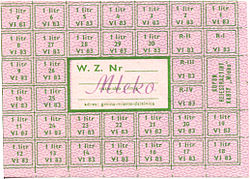Rationing
Rationing is when a person gives away a low amount of an already lowering amount of resources, goods, services,[1] or an artificial restriction of demand.
Rationing controls the size of the ration, which is one's allowed portion of the resources being distributed on a particular day or at a particular time.[2]
Rationing Media
- Romanian ration-card for bread, 1989.jpg
Romanian ration card, 1989
- "Food is Ammunition- Don't Waste It.", ca. 1918 - ca. 1918 - NARA - 512488.jpg
A 1918 advertisement urges civilians to preserve their food during World War I.
- Sample UK Childs Ration Book WW2.jpg
Child's ration book, used in Britain during the Second World War
- INF3-96 Food Production Dig for Victory Artist Peter Fraser.jpg
Poster for the "Dig for Victory" campaign, encouraging Britons to supplement their rations by cultivating gardens and allotments
Lining up at the Rationing Board Office, New Orleans, 1943
The diary of Tanya Savicheva, a girl of 11, her notes about starvation and deaths of her sister, then grandmother, then brother, then uncle, then another uncle, then mother. The last three notes say "Savichevs died", "Everyone died" and "Only Tanya is left." She died of intestinal tuberculosis shortly after the siege.
Tel Aviv residents standing in line to buy food rations, 1954
References
- ↑ "Rationing". The New Encyclopaedia Britannica (15th ed.). 1994.
government policy consisting of the planned and restrictive allocation of scarce resources and consumer goods, usually practiced during times of war, famine or some other national emergency.
- ↑ Cox, Stan (2013). "Any way you slice it: The past, present and future of rationing". New Press Books.




